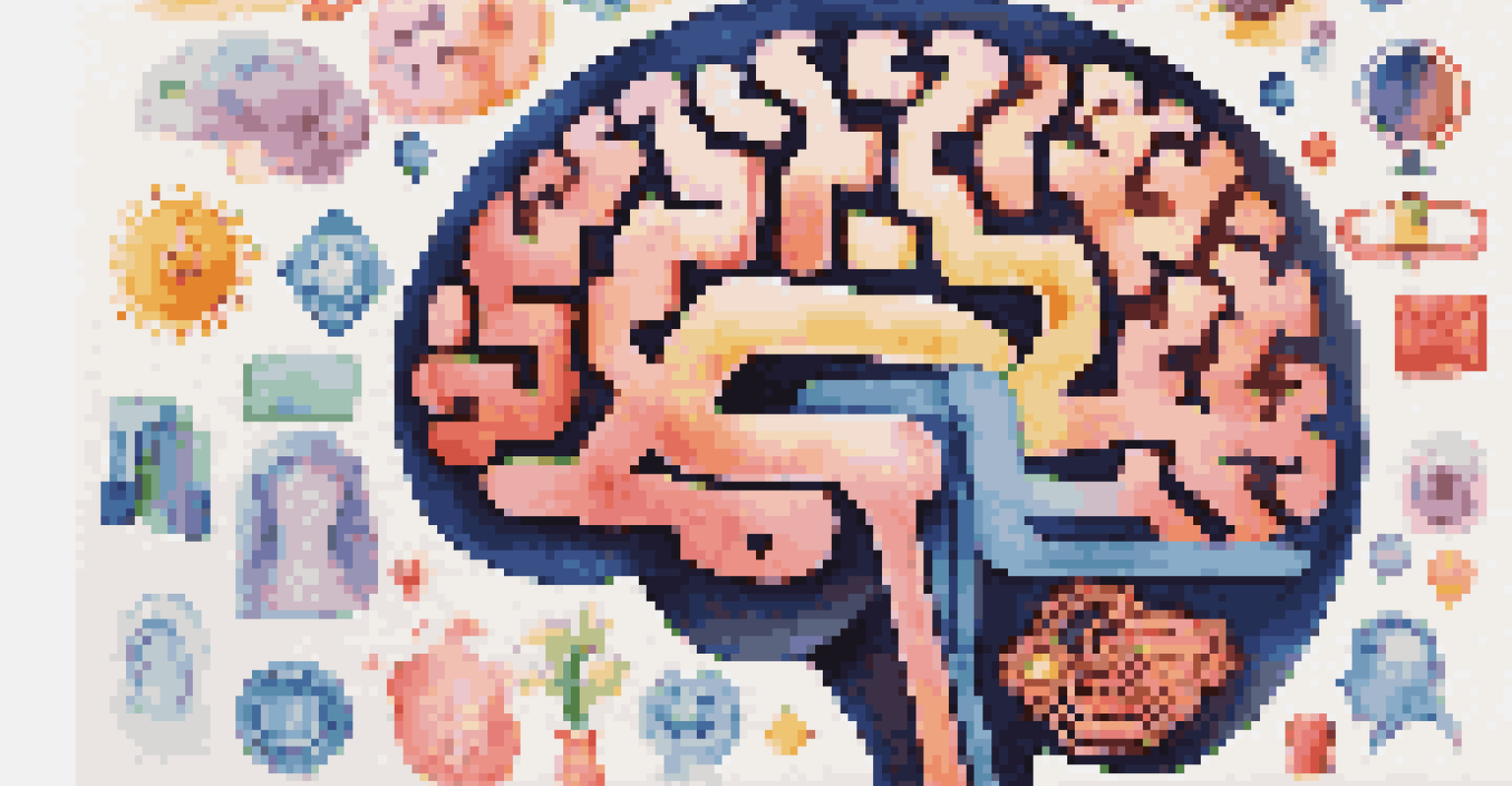The Physiological Effects of Sleep Disorders on the Body

What Are Sleep Disorders and Their Types?
Sleep disorders are conditions that disrupt normal sleep patterns, affecting how well we sleep and how we feel during waking hours. Common types include insomnia, sleep apnea, and restless leg syndrome. Each disorder presents unique challenges, often leading to a cycle of poor sleep and physiological effects on the body.
Sleep is the best meditation.
For instance, insomnia can manifest as difficulty falling or staying asleep, while sleep apnea involves interruptions in breathing during sleep. Understanding these distinctions is crucial because they influence not only sleep quality but also overall health. Without adequate sleep, the body struggles to recover and rejuvenate.
Recognizing these disorders is the first step in addressing their impact. By identifying the symptoms and understanding their mechanisms, we can begin to explore their effects on our physical health and well-being.
The Impact of Sleep Disorders on Hormonal Balance
Sleep plays a vital role in regulating hormones that control appetite, stress, and growth. Disruptions to sleep can lead to imbalances in hormones like cortisol, ghrelin, and leptin, which may result in weight gain and increased stress. For example, high cortisol levels can lead to heightened anxiety and difficulty managing stress.

Additionally, disrupted sleep can decrease levels of growth hormone, which is essential for tissue growth and muscle repair. When our bodies don’t get enough sleep, these processes slow down, impacting recovery from exercise and overall energy levels. This hormonal imbalance can create a ripple effect, influencing everything from mood to metabolic rate.
Sleep Disorders Disrupt Health
Sleep disorders can significantly impact both physical and mental health, affecting hormone balance, cognitive function, and chronic pain.
The relationship between sleep quality and hormonal health underscores the importance of addressing sleep disorders. By improving sleep, we can help restore hormonal balance, leading to better physical and emotional health.
Cognitive Consequences of Sleep Disorders
Sleep is crucial for cognitive functions such as memory, attention, and problem-solving. Sleep disorders can severely impair these functions, leading to difficulties in concentration and decision-making. For instance, people with sleep apnea may find themselves forgetful or unable to focus at work, impacting their productivity.
A good laugh and a long sleep are the best cures in the doctor’s book.
Moreover, chronic sleep deprivation has been linked to long-term cognitive decline, including an increased risk of conditions like Alzheimer’s disease. Lack of restorative sleep hinders the brain's ability to consolidate memories, making it harder to learn new information. This not only affects academic and professional performance but can also diminish overall life satisfaction.
By understanding the cognitive consequences of sleep disorders, we can recognize the urgency of seeking treatment. Prioritizing sleep health can lead to better mental clarity and improved quality of life.
The Role of Sleep Disorders in Chronic Pain
There is a strong connection between sleep disorders and chronic pain conditions such as fibromyalgia and arthritis. Poor sleep can exacerbate pain perception, leading to a vicious cycle where pain hinders sleep, and lack of sleep intensifies pain. This reciprocal relationship complicates the management of both issues.
Research shows that individuals with sleep disorders often report higher levels of pain and discomfort. This might be due to the body’s reduced ability to heal or recover during sleep, as restorative processes take place during the deeper stages of sleep. For instance, a restless night can leave someone feeling achy and fatigued the next day.
Lifestyle Changes Improve Sleep
Implementing lifestyle changes such as a consistent sleep schedule and relaxation techniques can enhance sleep quality.
Addressing sleep disorders can significantly improve pain management strategies. By prioritizing better sleep, individuals can enhance their pain tolerance and overall quality of life.
Sleep Disorders and Cardiovascular Health Risks
Sleep disorders, particularly sleep apnea, have been linked to an increased risk of cardiovascular diseases. Interrupted sleep can lead to elevated blood pressure and increased heart rate, placing extra strain on the heart. Over time, these factors can contribute to serious conditions like heart attack or stroke.
Moreover, lack of sleep affects the body’s ability to regulate inflammation, which is another risk factor for heart disease. Chronic inflammation can damage blood vessels and lead to plaque buildup, further complicating cardiovascular health. For example, individuals suffering from sleep apnea are often at higher risk for developing hypertension.
Recognizing the link between sleep disorders and cardiovascular health is crucial. By seeking treatment for sleep issues, individuals can take proactive steps to protect their heart health.
The Psychological Impact of Sleep Disorders
The effects of sleep disorders extend beyond physical health, significantly impacting mental well-being. Individuals suffering from conditions like insomnia often experience increased anxiety and depression. The frustration of not being able to sleep can lead to a cycle of negative thoughts and emotions.
Moreover, sleep deprivation can impair emotional regulation, making it harder to cope with daily stressors. For instance, someone who has not slept well may react more negatively to minor annoyances, escalating their emotional distress. This can create a barrier to personal and professional relationships.
Seek Help for Persistent Issues
Consulting a healthcare provider is essential if sleep disturbances persist, as professional treatment can greatly improve sleep quality.
Addressing sleep disorders can help alleviate these psychological burdens. Improving sleep can lead to better mood stability and a more positive outlook on life.
Lifestyle Changes to Combat Sleep Disorders
Making certain lifestyle changes can significantly improve sleep quality and help manage sleep disorders. Simple practices like maintaining a consistent sleep schedule, creating a calming bedtime routine, and limiting screen time before bed can enhance sleep hygiene. For instance, turning off devices an hour before sleep can help signal to your body that it’s time to wind down.
Incorporating relaxation techniques such as meditation or deep breathing can also promote better sleep. These practices reduce stress and calm the mind, making it easier to fall asleep. Regular physical activity during the day can additionally foster deeper sleep at night, as it helps regulate the sleep-wake cycle.

By adopting these lifestyle changes, individuals can take control of their sleep health. Small adjustments can lead to significant improvements in sleep quality and overall well-being.
When to Seek Professional Help for Sleep Disorders
Recognizing when to seek professional help for sleep disorders is crucial for effective treatment. If sleep disturbances persist despite lifestyle changes, or if they significantly impact daily functioning, it may be time to consult a healthcare provider. Symptoms like daytime fatigue, loud snoring, or frequent awakenings warrant further investigation.
Professionals can offer valuable insights and treatment options, including cognitive behavioral therapy for insomnia (CBT-I) or a sleep study to diagnose conditions like sleep apnea. These approaches can provide tailored solutions to improve sleep quality. For example, CBT-I focuses on changing negative thoughts and behaviors surrounding sleep, which has proven highly effective.
Taking action early can prevent long-term health complications associated with untreated sleep disorders. By prioritizing sleep health and seeking help, individuals can enhance their overall quality of life.